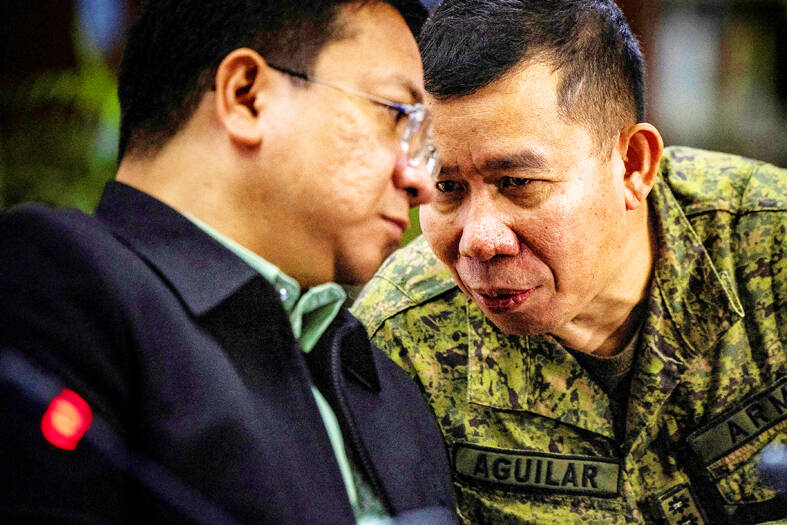The Philippines yesterday expressed alarm over the arrest of three Filipinos in China on suspicion of espionage, saying they were ordinary citizens and the arrests could be retaliation for Manila’s crackdown against alleged Chinese spies.
Chinese authorities arrested the Filipinos and accused them of working for the Philippine National Security Council to gather classified information on its military, the state-run China Daily reported earlier this week, citing state security officials.
It said the three had confessed to the crime.

Photo: Reuters
The National Security Council disputed Beijing’s accusations, saying the three were former recipients of a government scholarship program created under an agreement between the southern Chinese province of Hainan and the western Philippine province of Palawan.
“They are ordinary Filipino citizens with no military training who merely went to China at the invitation of the Chinese government to study,” National Security Council spokesman Jonathan Malaya said in a statement.
“They are law-abiding citizens with no criminal records and were vetted and screened by the Chinese government prior to their arrival there,” he added.
The Chinese embassy in Manila did not immediately respond to a request for comment outside office hours.
Hainan and Palawan both face the South China Sea, a strategic waterway where the two countries have staked out overlapping claims and have clashed frequently over the past two years.
“The arrests can be seen as a retaliation for the series of legitimate arrests of Chinese agents and accomplices by Philippine law enforcement,” Malaya said.
Philippine authorities have arrested at least a dozen Chinese nationals in the past three months on suspicion of espionage, accusing them of illegally obtaining sensitive information on military camps and critical infrastructure that could undermine Manila’s national security and defense.

Tens of thousands of Filipino Catholics yesterday twirled white cloths and chanted “Viva, viva,” as a centuries-old statue of Jesus Christ was paraded through the streets of Manila in the nation’s biggest annual religious event. The day-long procession began before dawn, with barefoot volunteers pulling the heavy carriage through narrow streets where the devout waited in hopes of touching the icon, believed to hold miraculous powers. Thousands of police were deployed to manage crowds that officials believe could number in the millions by the time the statue reaches its home in central Manila’s Quiapo church around midnight. More than 800 people had sought

DENIAL: Pyongyang said a South Korean drone filmed unspecified areas in a North Korean border town, but Seoul said it did not operate drones on the dates it cited North Korea’s military accused South Korea of flying drones across the border between the nations this week, yesterday warning that the South would face consequences for its “unpardonable hysteria.” Seoul quickly denied the accusation, but the development is likely to further dim prospects for its efforts to restore ties with Pyongyang. North Korean forces used special electronic warfare assets on Sunday to bring down a South Korean drone flying over North Korea’s border town. The drone was equipped with two cameras that filmed unspecified areas, the General Staff of the North Korean People’s Army said in a statement. South Korea infiltrated another drone

COMMUNIST ALIGNMENT: To Lam wants to combine party chief and state presidency roles, with the decision resting on the election of 200 new party delegates next week Communist Party of Vietnam General Secretary To Lam is seeking to combine his party role with the state presidency, officials said, in a move that would align Vietnam’s political structure more closely to China’s, where President Xi Jinping (習近平) heads the party and state. Next week about 1,600 delegates are to gather in Hanoi to commence a week-long communist party congress, held every five years to select new leaders and set policy goals for the single-party state. Lam, 68, bade for both top positions at a party meeting last month, seeking initial party approval ahead of the congress, three people briefed by

Cambodia’s government on Wednesday said that it had arrested and extradited to China a tycoon who has been accused of running a huge online scam operation. The Cambodian Ministry of the Interior said that Prince Holding Group chairman Chen Zhi (陳志) and two other Chinese citizens were arrested and extradited on Tuesday at the request of Chinese authorities. Chen formerly had dual nationality, but his Cambodian citizenship was revoked last month, the ministry said. US prosecutors in October last year brought conspiracy charges against Chen, alleging that he had been the mastermind behind a multinational cyberfraud network, used his other businesses to launder